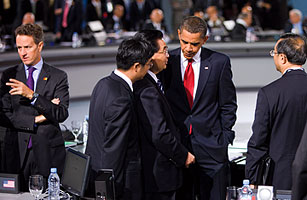
In friendlier times
The G-2 convenes on the sidelines of last year's G-20, held in Pittsburgh
(2 of 2)
Less public, but not necessarily less intense, has been frustration building in segments of the international business community operating in China. Many foreign businessmen interviewed by TIME in the wake of the Google announcement concede they are deeply conflicted by what has happened in the China market since the onset of the international financial crisis and the global slump that followed. On the one hand, many of their companies are leveraged to China's growth as never before. Ask General Motors, which is in bankruptcy in the U.S. but enjoys surging sales in what is now the largest market for cars in the world. At the same time, among many business executives, there is a sense that China is moving backward on issues of key concern to foreign businesses, from antitrust enforcement to intellectual-property protection to market-entry issues. As China prospered while much of the rest of the world slumped, attitudes among policymakers in Beijing and even in far-flung provinces have shifted noticeably, many foreign business executives say. Some call it arrogance. Some say it's simply increased confidence. But as Kent Kedl, a Shanghai-based consultant at Technomic Asia who helps foreign businesses navigate the China market, puts it, "Beijing's attitude is, My house, my toys, my rules."
An Emerging Backlash That perception has been shaped in part by some high-profile incidents last year. Many foreign companies were (and remain) stunned by the 2009 arrest of four executives from Rio Tinto, the minerals company, about a month after the Anglo-Australian giant decided not to accept a $19.5 billion investment from China's state aluminum company, Chinalco. Beijing insists the case against the men revolves around commercial bribery allegations, and has nothing to do with the Chinalco deal. But the widespread belief among foreign businesses is that the case represents little more than a fit of pique from jilted Chinese authorities.
Or consider antitrust regulation. In 2008, Beijing put into effect a muscular new antimonopoly law that, while in many ways an improvement over what had existed before, allows the state to protect "national brands." The Ministry of Commerce later blocked Coca-Cola's proposed acquisition of a well-known juice company called Huiyuan. The ruling befuddled independent lawyers who had looked at the proposed merger. Competition-wise, "this would not have [negatively] affected the nonalcoholic-beverage market at all," says Michael Gu, an attorney at the Zhong Lun Law Firm in Shanghai. Coca-Cola executives were privately shocked. The company, before the ruling, had unveiled a $90 million "global technology and innovation center" in Shanghai and committed to invest $2 billion in China over the next three years. Coke had been, in other words, close to a perfect corporate citizen in the country, and on the merits probably should have been able to acquire Huiyuan. But sources close to the aborted merger suspect the government's ruling was partly tipped by pressure from a local company that did not want Coke to acquire Huiyuan. Says an adviser to the deal: "It was home cooking, pure and simple, and it didn't taste real good."
Home cooking, of course, doesn't just exist in China when it comes to business deals. Uneven playing fields can be a fact of life pretty much anywhere business is done. The current angst among foreign businesses operating in China is that a fundamental precept for their investments there — particularly since 2001, when Beijing joined the World Trade Organization — is that on key business issues (intellectual-property protection, tariff barriers to entry, antitrust enforcement) things would slowly but surely continue to improve as the China market grew. And for a time, in the wake of WTO entry, they did. Now, some executives say, the problem is not simply that the momentum has slowed, but that it has gone into reverse.
The Google-driven Internet fight comes at a deeply awkward moment for China and the outside world. Trade clashes of the more prosaic kind — the U.S. steel industry filed another antidumping allegation against China in early January — were already intense. And that's not Beijing's only problem. China's trade relations with the E.U. — the country's biggest trading partner — are even worse than they are with Washington, because in a period when the U.S. dollar has been weak against the euro, China's de facto peg of the renminbi to the dollar has put excruciating pressure on many European companies trying to compete with Chinese producers.
Nobody ever said managing China's rise was going to be easy, not for Beijing and not for the rest of the world. There's never a good time for a trade war, but absolutely no one — Beijing, Washington, Brussels — can afford one now. Someone's got to reconvene the grown-ups' table.